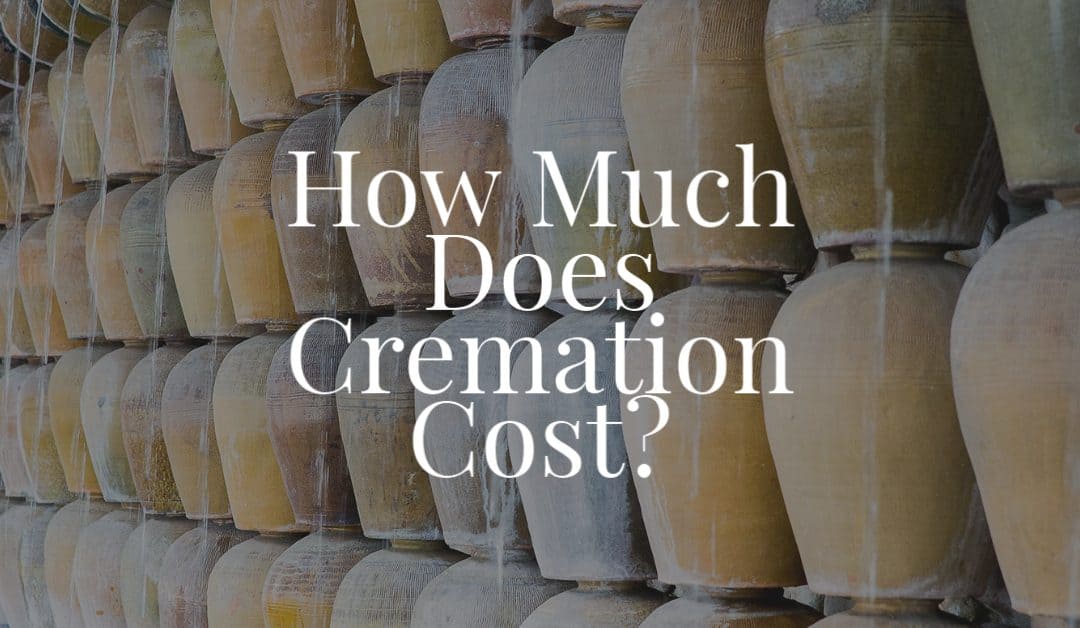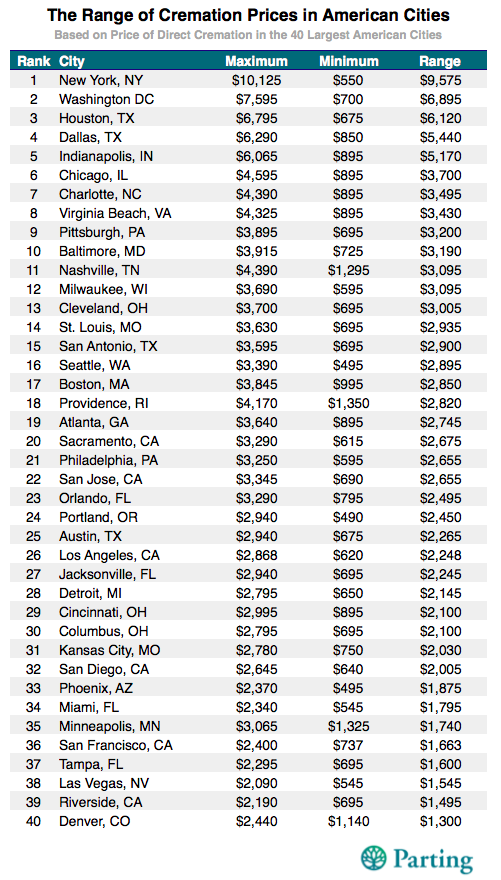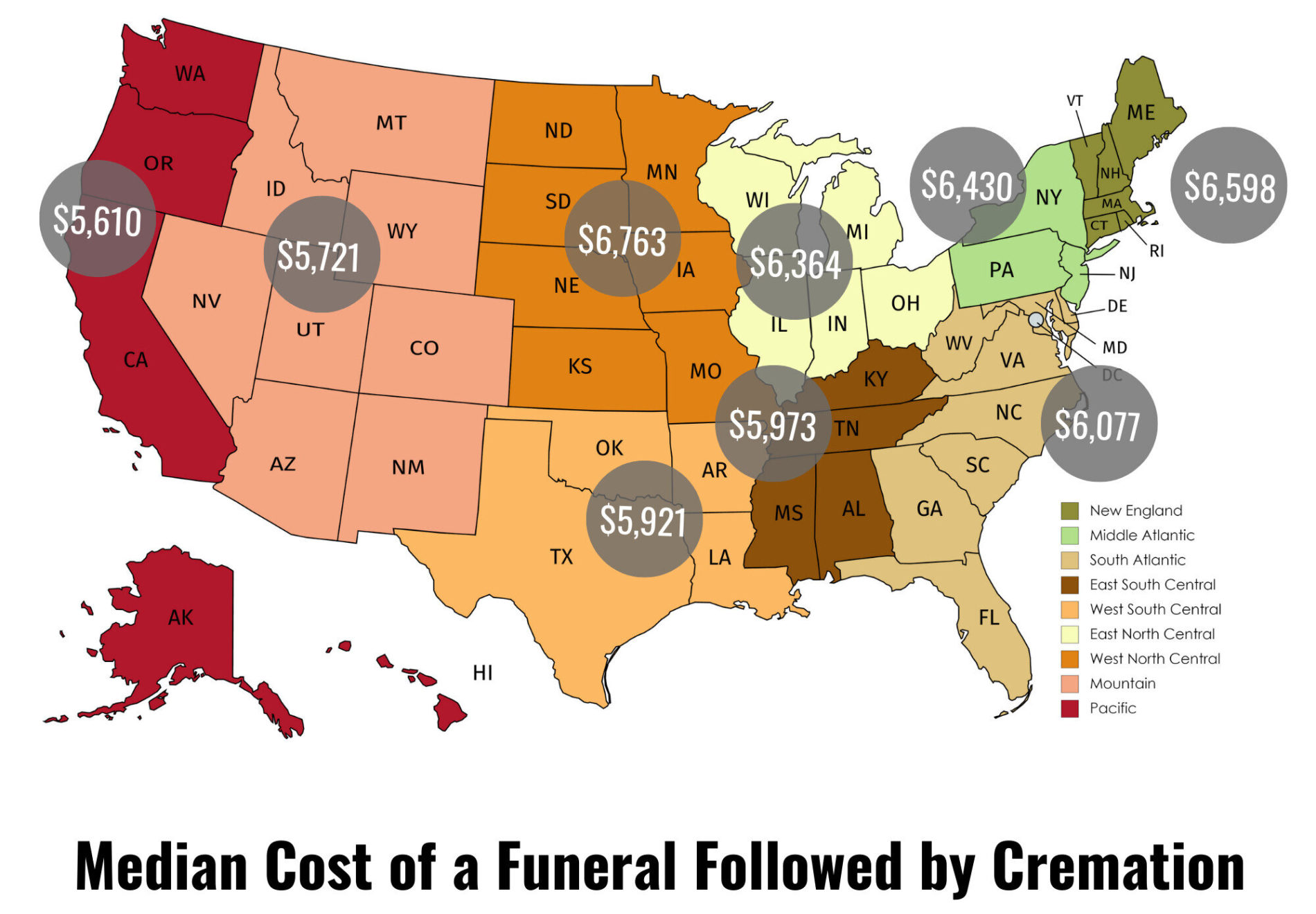How Much is Cremation: A Comprehensive Cost Breakdown

Cremation costs vary widely depending on several factors. However, the average cost of a cremation in the United States ranges from $1,500 to $3,500.
When a loved one passes away, making funeral arrangements can be a daunting task. One important decision to consider is the choice between burial and cremation. Cremation is becoming an increasingly popular option due to its affordability and simplicity. But how much does cremation actually cost?
The answer to this question can vary depending on various factors such as location, funeral home, additional services, and urn selection. In this blog post, we will explore the average cost of cremation and the factors that can impact the overall price. By understanding these factors, you can make an informed decision and plan accordingly.
The Rise Of Cremation
In recent years, the trend of choosing cremation over traditional burial has been steadily increasing. This shift is attributed to various factors, including cost-effectiveness, environmental concerns, and changing cultural attitudes towards death.
Shifting Preferences In Final Arrangements
Cremation is becoming a popular choice for many individuals and families for its simplicity and affordability. It offers flexibility in memorialization options and provides a sense of comfort to loved ones.
Statistical Trends And Cultural Shifts
Statistics show a significant rise in the number of people opting for cremation. Cultural norms around death and funerals are evolving, leading to a greater acceptance of cremation as a dignified and respectful choice.
Cremation Vs. Burial: Cost Comparison
Cremation is generally less expensive than traditional burial. The average cost of cremation in the US is around $1,000 to $3,000, while a traditional burial can cost upwards of $7,000. However, the cost can vary depending on location and additional services.
When it comes to making end-of-life arrangements, one of the biggest decisions people face is whether to opt for cremation or burial. While both options have their own set of advantages and disadvantages, one of the most important considerations for many families is the cost. Understanding how much is cremation can help families make an informed decision that best suits their financial situation and personal preferences. Average Expenses for Cremation Cremation tends to be less expensive than burial, making it an attractive option for those on a budget. The average cost of cremation varies depending on a range of factors, including the location, the service provider, and the specific services selected. However, on average, cremation is significantly less expensive than burial, costing anywhere from $1,000 to $4,000. Typical Burial Costs Burial, on the other hand, tends to be more expensive due to the cost of a casket, burial plot, and other related expenses. The average cost of a traditional funeral and burial in the United States is around $7,000 to $10,000, although this can vary widely depending on the location, the funeral home, and the specific services selected. Cremation vs. Burial: Cost Comparison To help you make an informed decision about which option is best for you and your family, it’s important to compare the costs of cremation and burial side by side. Here’s a breakdown of the average expenses associated with each option: | Expense | Cremation | Burial | | — | — | — | | Service fees | $1,000 – $4,000 | $1,500 – $3,000 | | Casket or urn | $0 – $1,000 | $2,000 – $5,000 | | Cemetery plot | $0 – $1,000 | $1,000 – $4,000 | | Headstone or marker | $0 – $1,500 | $1,000 – $3,000 | | Total | $1,000 – $6,500 | $5,500 – $15,000 | As you can see, cremation is generally the more affordable option, with total costs ranging from $1,000 to $6,500. However, it’s important to keep in mind that the specific costs will depend on a range of factors, including the location and service provider. Ultimately, the decision between cremation and burial will depend on your own personal preferences, beliefs, and budget.
Direct Cremation Explained
Direct Cremation Explained: Wondering how much cremation costs? Direct cremation offers a cost-effective alternative. With prices ranging from $700 to $3,000, it provides a simple and affordable way to honor a loved one’s final wishes.
Basics Of Direct Cremation
Direct cremation is a simple and straightforward method of disposition that has gained popularity in recent years. Unlike traditional cremation services, direct cremation does not involve any funeral ceremonies or viewings. Instead, the deceased is promptly taken to a crematory, where the cremation process takes place.
Direct cremation is often chosen as an alternative to traditional burial or cremation services due to its simplicity and cost-effectiveness. It offers a dignified and efficient way to handle the final arrangements without the need for elaborate ceremonies or additional expenses.
How Direct Cremation Saves Money
One of the primary reasons many people opt for direct cremation is its affordability compared to traditional funeral services. By eliminating the need for embalming, caskets, and other funeral-related expenses, direct cremation significantly reduces the overall cost.
Here are some key ways in which direct cremation can save you money:
- No Need for Embalming: Direct cremation does not require embalming, which can be a costly process. Embalming is typically done to preserve the body for viewing, but since direct cremation does not involve any viewing, this step is unnecessary.
- No Costly Caskets: With direct cremation, there is no need to purchase an expensive casket. Instead, a simple cremation container or an affordable cremation casket can be used, reducing the overall cost significantly.
- No Funeral Services: Traditional funeral services often come with additional expenses, including venue rentals, flowers, transportation, and catering. Since direct cremation does not involve any formal funeral ceremonies, these costs can be avoided.
- No Burial Plot or Headstone: Direct cremation eliminates the need for a burial plot or a headstone, which can be a significant expense. Instead, the ashes can be stored in an urn or scattered in a location of your choosing.
By opting for direct cremation, you can save a substantial amount of money while still ensuring a respectful and meaningful final disposition for your loved one.

Credit: rfhr.com
Additional Cremation Services
Additional cremation services may increase the cost of cremation. Prices vary depending on the type of service selected, such as direct cremation or full-service cremation, and any additional features. It is important to research and compare options to find the most affordable and suitable choice for your needs.
When it comes to cremation services, there are a variety of options to choose from. In addition to the basic cremation package, many funeral homes offer additional services to help families honor their loved ones. These services can vary in cost depending on the funeral home and location. Here are some of the additional cremation services you may want to consider:
Memorial Services And Their Costs
Memorial services are a common way to honor someone who has passed away. These services can be held before or after the cremation, and can be personalized to reflect the life of the deceased. The cost of a memorial service can vary depending on the location and the services provided. Here are some of the costs you can expect for a memorial service:
- Location rental: $200-$500
- Funeral director services: $500-$1,500
- Floral arrangements: $50-$500
- Music or musicians: $100-$500
- Catering: $10-$50 per person
Cremation With Viewing Options
For families who wish to have a viewing before the cremation, there are options available. Some funeral homes offer rental caskets for the viewing, while others provide cremation caskets or containers. The cost of a viewing can vary depending on the location and the services provided. Here are some of the costs you can expect for a cremation with viewing:
- Rental casket: $200-$1,000
- Cremation casket or container: $100-$1,000
- Embalming: $300-$800
- Funeral director services: $500-$1,500
In conclusion, additional cremation services can add to the overall cost of a cremation. It’s important to discuss your options with your funeral director and choose services that honor your loved one while staying within your budget.
Factors Influencing Cremation Pricing
When considering cremation, it’s important to understand the factors that influence pricing. This knowledge can help you make informed decisions during a difficult time.
Geographical Variations
Cremation costs can vary significantly based on the location. Urban areas tend to have higher prices due to the higher cost of living and operating a crematorium. Rural areas typically have lower costs, as overhead expenses are generally lower.
Service Provider Differences
Different cremation service providers may offer varying packages and pricing structures. It’s essential to carefully review what’s included in each package to ensure it meets your needs and budget. Some providers may include additional services in their base pricing, while others may charge extra for these services.
Cremation Products And Their Prices
When planning for a cremation service, it’s essential to consider the various cremation products available and their corresponding prices. These products not only serve as a final resting place for the ashes but also allow loved ones to honor and remember the departed in a meaningful way. In this section, we will explore the prices and options for urns, keepsakes, cremation caskets, and containers.
Urns And Keepsakes
Urns are perhaps the most common and traditional choice for storing cremated remains. They come in a wide range of materials, designs, and sizes, catering to different preferences and budgets. Here are some popular types of urns:
- Standard Urns: These are typically made of materials like wood, ceramic, or metal and offer a simple yet elegant design. Prices for standard urns can range from as low as $50 to several hundred dollars.
- Biodegradable Urns: Designed for eco-conscious individuals, biodegradable urns are made from materials like paper, bamboo, or salt. These urns naturally decompose over time, allowing the ashes to be returned to the earth. Prices for biodegradable urns generally range from $50 to $150.
- Keepsake Urns: Keepsake urns are smaller versions of standard urns and are ideal for families who wish to divide the ashes among multiple loved ones or keep a small portion as a memento. Prices for keepsake urns typically start around $30 and can go up to $150 depending on the material and design.
Cremation Caskets And Containers
While caskets are commonly associated with traditional burials, there are options available specifically designed for cremation services. These caskets and containers offer a dignified way to transport the body for the cremation process. Here are some options to consider:
- Combination Caskets: These caskets are made of materials like wood or metal and are designed to accommodate both traditional burials and cremation services. Prices for combination caskets can vary widely, starting from around $1,000 and going up to several thousand dollars.
- Cremation Containers: These containers are simpler and more lightweight than traditional caskets, specifically designed for the cremation process. They are typically made of materials like cardboard or particleboard and are more cost-effective. Prices for cremation containers generally range from $100 to $500.
It’s important to note that prices for cremation products can vary based on factors such as material, craftsmanship, size, and additional customization options. When making a decision, it’s essential to consider personal preferences, budget constraints, and any specific requirements or wishes of the deceased or their loved ones.
Hidden Costs In Cremation
When considering cremation, it’s crucial to be aware of potential hidden costs that can catch you off guard. Understanding the additional fees associated with cremation services can help you plan your budget effectively.
Potential Additional Fees
- Urn: Prices can vary based on material and design.
- Cremation Process: Some providers may charge extra for the actual cremation.
- Memorial Service: Costs for arranging a memorial or service can add up.
- Death Certificate: Obtaining certified copies may come with a fee.
Avoiding Unexpected Expenses
- Research: Compare prices from different cremation service providers.
- Ask Questions: Clarify all potential costs upfront before making a decision.
- Preplan: Consider preplanning to lock in current prices and avoid future increases.

Credit: www.parting.com
Planning Ahead: Prepaid Cremation Plans
When considering cremation costs, prepaid plans offer a practical solution. Planning ahead with prepaid cremation plans ensures financial security and peace of mind.
Benefits Of Prepayment
- Lock in current prices, avoiding future cost increases.
- Relieve financial burden on loved ones.
- Customize services according to your preferences.
- Ensure your wishes are fulfilled without uncertainty.
Choosing The Right Plan
- Research reputable providers with transparent pricing.
- Compare plan options and included services.
- Consider additional expenses like urns or memorial services.
- Review payment terms and cancellation policies.
Financial Assistance And Low-cost Options
Explore financial assistance and low-cost options for cremation services. Discover how much cremation typically costs and find affordable alternatives for honoring your loved ones. Get the support you need without compromising on quality or service.
Financial assistance and low-cost options are available for cremation services.
Charitable Programs And Aid
Charitable organizations offer help to cover cremation costs.
Government And Local Resources
Government programs and local resources provide financial support for cremation services.

Credit: www.lhlic.com
Cremation Insurance Policies
Cremation insurance policies can vary in cost depending on the provider and the level of coverage. The average cost of cremation in the United States is around $3,000 to $5,000, making it a more affordable option compared to traditional burials.
It’s important to consider different insurance policies to find one that best fits your needs and budget.
Understanding Insurance Coverage
Cremation insurance policies provide financial coverage for cremation expenses. These policies ensure that your loved ones are not burdened with costs after you pass away.
Comparing Cremation Insurance Providers
Provider
Policy Type
Cost
1. ABC Insurance – Whole Life – $30/month 2. XYZ Insurance – Term Life – $20/month 3. DEF Insurance – Preneed – $25/month When choosing a cremation insurance provider, consider factors like policy type and cost. Comparing different providers can help you find the best fit for your needs.
Eco-friendly Cremation Choices
Eco-friendly cremation choices offer a sustainable and affordable option for those seeking a greener alternative. The cost of cremation varies depending on location and specific services, but it generally ranges from $500 to $3,000. Opting for a direct cremation can help minimize expenses while still honoring a loved one’s wishes.
Green Cremation Methods
When it comes to eco-friendly cremation choices, there are several green cremation methods that prioritize sustainability and minimize the environmental impact. These methods offer alternatives to traditional cremation practices, allowing individuals to make more environmentally conscious decisions for their end-of-life arrangements.
One popular green cremation method is bio-cremation, also known as alkaline hydrolysis or water cremation. This process uses water and an alkaline solution to break down the body, resulting in a liquid solution that is safe to return to the environment. Bio-cremation consumes significantly less energy compared to traditional cremation and does not emit harmful emissions such as carbon dioxide or mercury.
Another eco-friendly option is natural or green burial. Instead of cremation, this method involves burying the body in a biodegradable casket or shroud, allowing it to decompose naturally and contribute to the growth of plants and trees. Natural burial helps conserve land, reduces the use of resources, and eliminates the carbon emissions associated with cremation.
Cost Implications Of Eco-friendly Options
Opting for eco-friendly cremation choices may have cost implications compared to traditional cremation methods. While the exact costs can vary depending on factors such as location and service providers, it is important to consider the long-term benefits and environmental impact when making a decision.
For example, bio-cremation may have a higher upfront cost due to the specialized equipment required for the process. However, it can save money in the long run by reducing energy consumption and eliminating the need for expensive caskets or embalming chemicals. Natural burial, on the other hand, can be a more cost-effective option as it eliminates the need for cremation fees and associated services.
It’s important to weigh the financial implications alongside the environmental benefits when considering eco-friendly cremation choices. While the initial costs may differ, choosing a green cremation method can be a meaningful and sustainable way to honor a loved one’s memory while minimizing the impact on the planet.
Navigating The Legal Aspects Of Cremation
When it comes to navigating the legal aspects of cremation, understanding the required documentation, state regulations, and compliance costs is essential. Let’s delve into the specifics to shed light on this important aspect of the cremation process.
Required Documentation
Before proceeding with a cremation, several key documents are typically required. These may include the deceased’s death certificate, a cremation authorization form signed by the next of kin or designated agent, and any relevant permits or authorizations.
State Regulations And Compliance Costs
State regulations regarding cremation can vary, impacting the necessary paperwork and associated costs. It’s important to be aware of the specific regulations in your state, as well as any compliance costs that may apply. These costs can encompass permit fees, medical examiner fees, and any additional documentation required by local or state authorities.
Frequently Asked Questions
What Factors Influence The Cost Of Cremation?
The cost of cremation is influenced by factors such as location, additional services, and choice of urn. Prices may also vary based on the funeral home or crematory selected.
Is Cremation More Affordable Than Traditional Burial?
Yes, cremation is generally more affordable than traditional burial. With fewer expenses related to caskets, embalming, and cemetery plots, cremation offers a cost-effective alternative.
What Is Included In The Cost Of Cremation?
The cost of cremation typically includes services such as transportation, cremation itself, and the use of a basic urn. Additional fees may apply for optional services or special urns.
Are There Financial Assistance Options For Cremation?
Some families may be eligible for financial assistance with cremation costs through state or local programs, veterans’ benefits, or life insurance policies. It’s advisable to inquire about these options with the chosen funeral provider.
Conclusion
Understanding the cost of cremation can alleviate financial stress during a difficult time. By exploring the various factors that influence pricing, individuals can make informed decisions and plan ahead. With careful research and consideration, families can find affordable options that honor their loved ones with dignity and respect.





